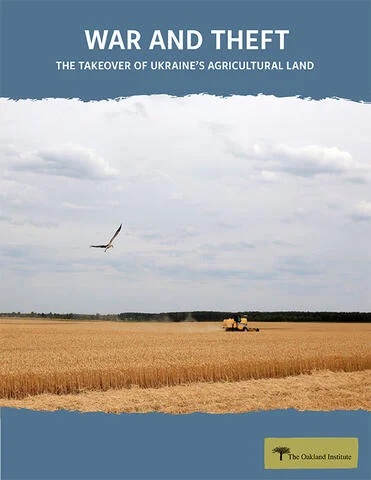Resource information
War and Theft: The Takeover of Ukraine’s Agricultural Land, exposes the financial interests and the dynamics at play leading to further concentration of land and finance.
The total amount of land controlled by oligarchs, corrupt individuals, and large agribusinesses is over nine million hectares — exceeding 28 percent of Ukraine’s arable land. The largest landholders are a mix of Ukrainian oligarchs and foreign interests — mostly European and North American as well as the sovereign fund of Saudi Arabia. Prominent US pension funds, foundations, and university endowments are invested through NCH Capital, a US-based private equity fund.
Several agribusinesses, still largely controlled by oligarchs, have opened up to Western banks and investment funds — including prominent ones such as Kopernik, BNP, or Vanguard — who now control part of their shares. Most of the large landholders are substantially indebted to Western funds and institutions, notably the European Bank for Reconstruction and Development (EBRD) and the World Bank.
Western financing to Ukraine in recent years has been tied to a drastic structural adjustment program that has required austerity and privatization measures, including the creation of a land market for the sale of agricultural land. President Zelenskyy put the land reform into law in 2020 against the will of the vast majority of the population who feared it would exacerbate corruption and reinforce control by powerful interests in the agricultural sector. Findings of the report concur with these concerns. While large landholders are securing massive financing from Western financial institutions, Ukrainian farmers — essential for ensuring domestic food supply — receive virtually no support. With the land market in place, amidst high economic stress and war, this difference of treatment will lead to more land consolidation by large agribusinesses.
The report also sounds the alarm that Ukraine’s crippling debt is being used as a leverage by the financial institutions to drive post-war reconstruction towards further privatization and liberalization reforms in several sectors, including agriculture.


